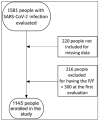Impact of Early SARS-CoV-2 Antiviral Therapy on Disease Progression
- PMID: 36680111
- PMCID: PMC9865563
- DOI: 10.3390/v15010071
Impact of Early SARS-CoV-2 Antiviral Therapy on Disease Progression
Abstract
Since the start of the SARS-CoV-2 pandemic, several treatments have been proposed to prevent the progression of the disease. Currently, three antiviral (molnupiravir, nirmaltrevir/r, remdesivir) and two monoclonal antibodies (casirivimab/imdevimab and sotrovimab) are available in Italy. Therefore, we aimed to evaluate the presence of risk factors associated with disease progression. We conducted a retrospective cohort study, including all patients with a confirmed diagnosis of SARS-CoV-2 evaluated between 01/01/2022 ad 10/05/2022 by our Unit of Infectious Diseases in Sassari. We defined disease progression as the necessity of starting O2 therapy. According to AIFA (Italian Medicines Agency) indications, preventive treatment was prescribed in patients with recent symptoms onset (≤five days), no need for oxygen supplementation, and risk factors for disease progression. Subgroup differences in quantitative variables were evaluated using Student's t-test. Pearson chi-square or Fisher's exact tests were used to assess differences for qualitative variables. Multivariate logistic regression modelling was performed to determine factors associated with progression. A two-tailed p-value less than 0.05 was considered statistically significant. All statistical analyses were performed with STATA version 17 (StataCorp, College Station, TX, USA). We included 1145 people with SARS-CoV-2 diagnosis, of which 336 (29.3%) developed severe disease with oxygen supplementation. In multivariate logistic regression analysis, age, dementia, haematologic tumors, heart failure, dyspnoea or fever at first evaluation, having ground glass opacities or consolidation at the first CT scan, and bacteria coinfection were associated with an increased risk of disease progression. Vaccination (at least two doses) and early treatment with antiviral or monoclonal antibodies were associated with a lower risk of disease progression. In conclusion, our study showed that vaccination and early treatment with antiviral and/or monoclonal antibodies significantly reduce the risk of disease progression.
Keywords: COVID-19; SARS-CoV-2; antiviral treatment; disease progression; molnupiravir; monoclonal antibody; nirmatrelvir/ritonavir; remdesivir; vaccination.
Conflict of interest statement
The authors declare no conflict of interest.
Figures
Similar articles
-
Exploring the Use of Monoclonal Antibodies and Antiviral Therapies for Early Treatment of COVID-19 Outpatients in a Real-World Setting: A Nationwide Study from England and Italy.BioDrugs. 2023 Sep;37(5):675-684. doi: 10.1007/s40259-023-00601-w. Epub 2023 May 6. BioDrugs. 2023. PMID: 37148526 Free PMC article.
-
Exploratory data on the clinical efficacy of monoclonal antibodies against SARS-CoV-2 Omicron variant of concern.Elife. 2022 Nov 22;11:e79639. doi: 10.7554/eLife.79639. Elife. 2022. PMID: 36413383 Free PMC article. Clinical Trial.
-
What Is the Efficacy of Sotrovimab in Reducing Disease Progression and Death in People with COVID-19 during the Omicron Era? Answers from a Real-Life Study.Viruses. 2023 Aug 17;15(8):1757. doi: 10.3390/v15081757. Viruses. 2023. PMID: 37632099 Free PMC article.
-
COVID-19 treatments approved in the European Union and clinical recommendations for the management of non-hospitalized and hospitalized patients.Ann Med. 2022 Dec;54(1):2856-2860. doi: 10.1080/07853890.2022.2133162. Ann Med. 2022. PMID: 36259490 Free PMC article. Review.
-
Treatment Options for Patients With Mild-to-Moderate Coronavirus Disease 2019 in Korea.J Korean Med Sci. 2022 Dec 12;37(48):e352. doi: 10.3346/jkms.2022.37.e352. J Korean Med Sci. 2022. PMID: 36513054 Free PMC article. Review.
Cited by
-
Retrospective Cohort Study on Determinants of Mechanical Ventilation Duration of COVID-19 ICU Patients.Cureus. 2024 Jan 29;16(1):e53169. doi: 10.7759/cureus.53169. eCollection 2024 Jan. Cureus. 2024. PMID: 38420058 Free PMC article.
-
Real-world experience with therapies for SARS-CoV-2: Lessons from the Italian COVID-19 studies.Infez Med. 2025 Mar 1;33(1):64-75. doi: 10.53854/liim-3301-6. eCollection 2025. Infez Med. 2025. PMID: 40071259 Free PMC article. Review.
-
Is the 4C Score Still a Valid Item to Predict In-Hospital Mortality in People with SARS-CoV-2 Infections in the Omicron Variant Era?Life (Basel). 2023 Jan 8;13(1):183. doi: 10.3390/life13010183. Life (Basel). 2023. PMID: 36676132 Free PMC article.
-
New score to predict COVID-19 progression in vaccine and early treatment era: the COVID-19 Sardinian Progression Score (CSPS).Eur J Med Res. 2024 Feb 15;29(1):123. doi: 10.1186/s40001-024-01718-6. Eur J Med Res. 2024. PMID: 38360688 Free PMC article.
-
Shedding new light on COVID-19 therapeutics during the omicron era: a deeper dive into real-world data.Lancet Reg Health Eur. 2023 Jul 18;31:100694. doi: 10.1016/j.lanepe.2023.100694. eCollection 2023 Aug. Lancet Reg Health Eur. 2023. PMID: 37547278 Free PMC article. No abstract available.
References
-
- Commission WMH Report of Clustering Pneumonia of Unknown Etiology in Wuhan City. [(accessed on 1 March 2020)]; Published 31 December 2019. Available online: http://wjw.wuhan.gov.cn/front/web/showDetail/2019123108989.
-
- WHO . World Health Organization; 2022. [(accessed on 11 May 2020)]. COVID-19 Weekly Epidemiological Ipdate; pp. 1–23. Available online: https://www.who.int/publications/m/item/covid-19-weekly-epidemiological-....
-
- de Vito A., Geremia N., Fiore V., Princic E., Babudieri S., Madeddu G. Clinical features, laboratory findings and predictors of death in hospitalized patients with COVID-19 in Sardinia, Italy. Eur. Rev. Med. Pharmacol. Sci. 2020;24:7861–7868. - PubMed
MeSH terms
Substances
LinkOut - more resources
Full Text Sources
Medical
Miscellaneous


